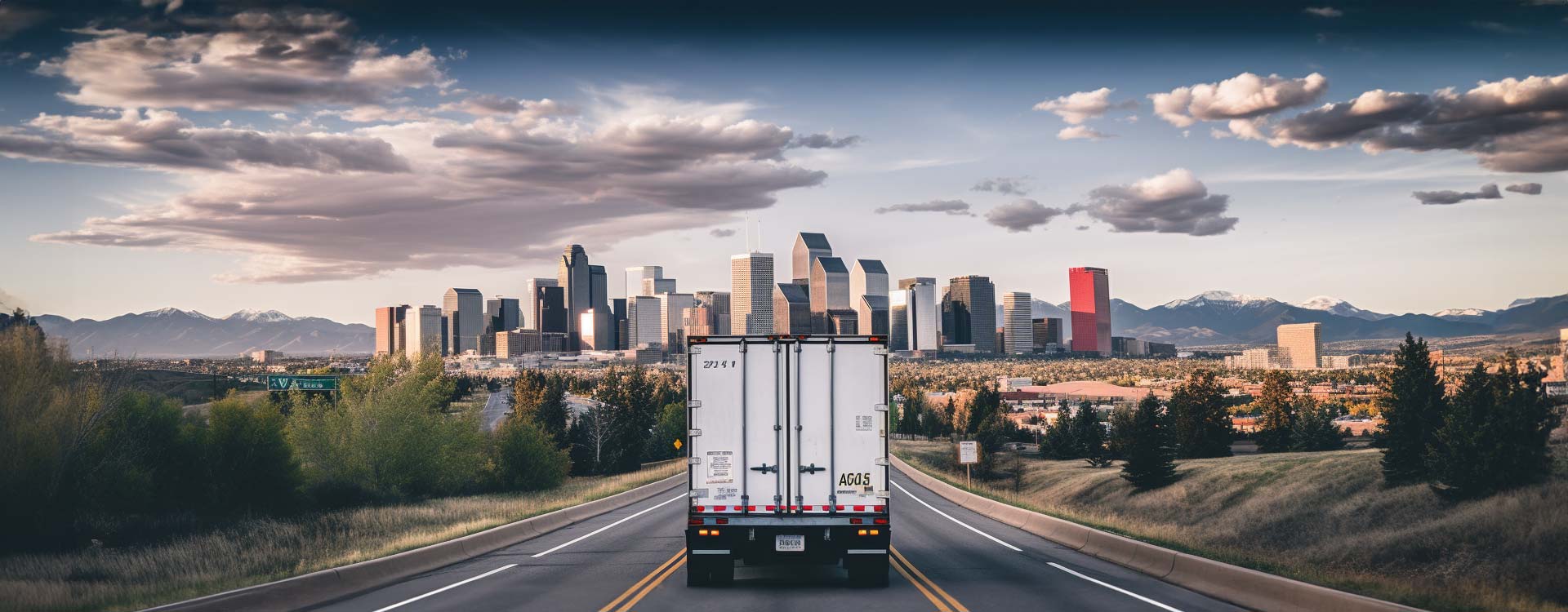Originally founded in 1848 as a mining town, Denver is known for its diverse history, amazing people, blue skies, and, thanks to the Rocky Mountains, the city’s unparalleled views. You are considering taking a leap and relocating to the Mile High City – but aren’t sure if living in Denver is the right choice for you and your family.
Whether you are moving to Denver from San Diego, San Francisco, Atlanta, New York City, or anywhere else in the United States, here is an insider’s guide to what it is really like to live in Denver – including the great and the not-so-great.
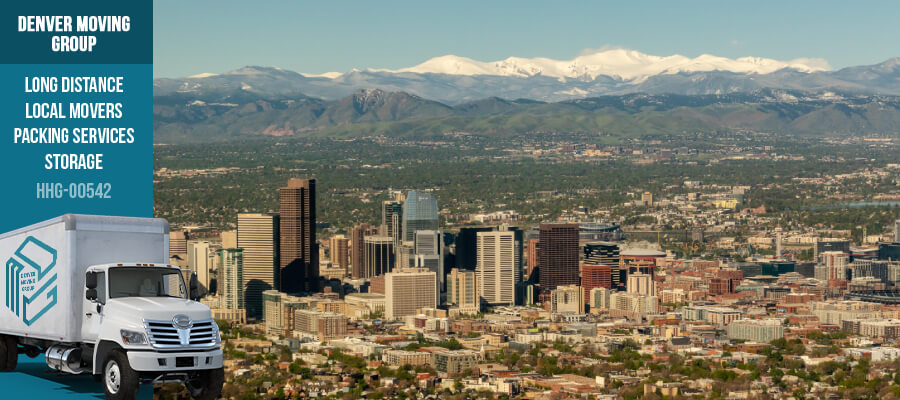
Moving to Denver: Mountains vs. Front Range
Denver is situated in an area called the Front Range, which is at the base of the Rocky Mountains and adjacent to the Rocky Mountain National Park. You might be surprised to learn that the majority of Denver residents, and the residents of Colorado for that matter, live in the Front Range area.
If you have narrowed your options to the rocky terrain of the Front Range or bustling Denver, you need to consider the pros and cons of calling these polar opposite living situations home.
Colorado’s Front Range and downtown Denver both have a very eclectic feel. Because of the population density, there is more to offer in the downtown area, including shopping, restaurants, and bars. There are several quaint small towns throughout the Front Range, so if you prefer family-owned boutiques and small antique and curiosity shops over name-brand stores found in the big city, the Front Range is a fun place to live.
In addition to the shopping and the population density, you need to consider the climate and the weather. Denver is a beautiful city – until November hits and the snow starts to fall. For as bad as the snow, ice, and cold can get in Denver, the weather is much worse on the Front Range. Obviously, the further up the mountains you climb, the worse the conditions can be.
If you are commuting to Denver, Boulder, or any of the suburbs around Denver, purchase a home at the base of the Front Range. The biggest obstacle with this plan is, however, the average home prices are higher, but you won’t be spending as much time shoveling snow in the winter.
Finding the Right Neighborhood When Moving to Denver
There are 78 official neighborhoods in the greater Denver area as of 2013. Like any other big city, each neighborhood is unique attributes. Some neighborhoods are ideal for young families because of the fantastic school districts, while others are the ideal neighborhood for professionals and retirees to call home.
Ask any local, and they will tell you these are a few of the best neighborhoods in the metro area:
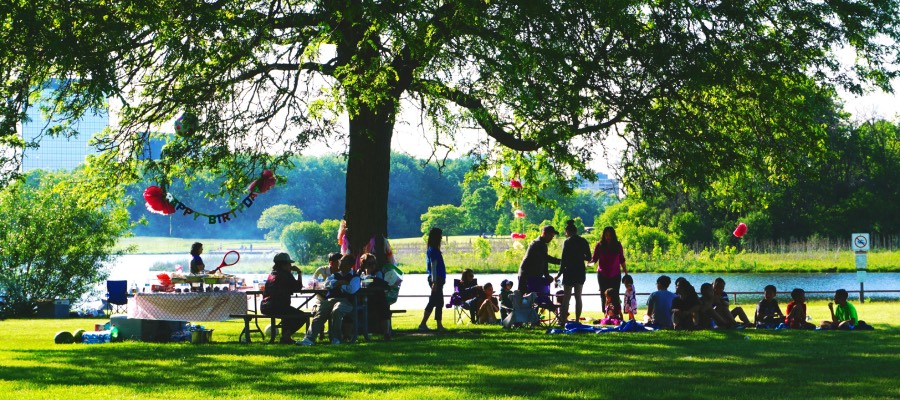
Washington Park
Washington Park is one of Denver’s oldest and most popular neighborhoods – and for good reason. Wash Park actually gets its name from the 150-acre park in the neighborhood’s center. Many even compare Washington Park to Central Park!
There are plenty of green spaces, options for hiking and biking, and an excellent school district. Be aware that housing costs have risen in the past few years in the area.
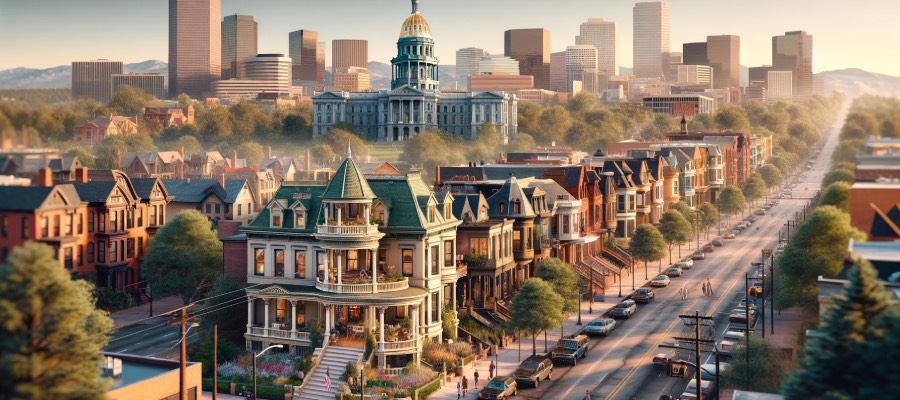
Capitol Hill
Otherwise known as “Cap Hill,” the Capitol Hill area is very popular amongst locals. What this means for you as a newcomer is a chance to immerse yourself in the cultural scene and really get to know the locals. However, this also means that housing costs are both higher, and houses and apartments are harder to find. However, if you are lucky enough to live in Capitol Hill, you can enjoy one of the best neighborhoods in a great city.
Sloans Lake
Situated in NW Denver, Sloans Lake is the biggest lake in Denver proper and the host of the Denver Dragon Boat Festival. The area is known for its top-notch schools, quiet nights, and relatively low crime rates. The neighborhood is close to downtown Denver, making it ideal for anyone who wants to commute from their peaceful home to their job. Like the other popular neighborhoods in Denver, housing costs are rising, and the rental market is competitive.
Cherry Creek
Most people move to Denver for the unique combination of high-end city life and easy access to the Rocky Mountain National Park, skiing, and the chance to enjoy a little recreational marijuana! Even amongst the unique neighborhoods in Denver, Cherry Creek stands out. The area provides an opportunity for outdoor adventure – including the Cherry Creek Bike Path – and is filled with several high-end boutiques, restaurants, and a fantastic array of million-dollar houses.
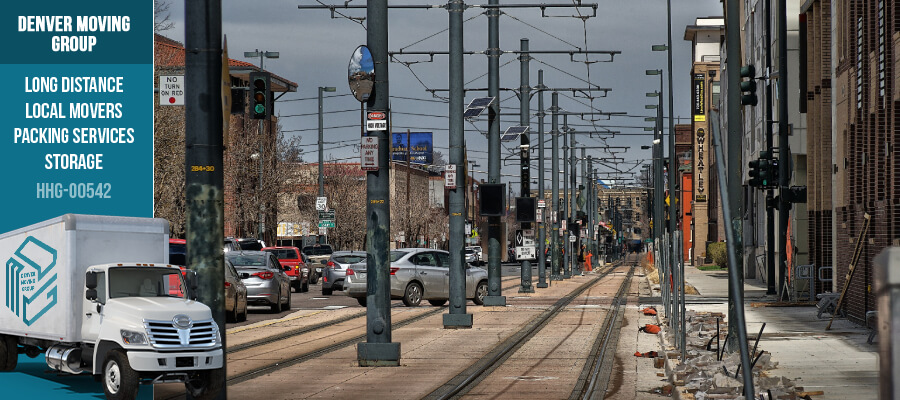
Five Points
Affectionately called the “Harlem of the West,” Five Points comprises three smaller neighborhoods: River North, Ballpark, and Curtis Park. The housing market in Five Points is not as competitive as in other parts of the city. This is because Five Points is not as safe as the other family-friendly neighborhoods. However, if you want a mixture of vibrant nightlife and bike trails, and walking paths, Five Point might be the neighborhood for you.
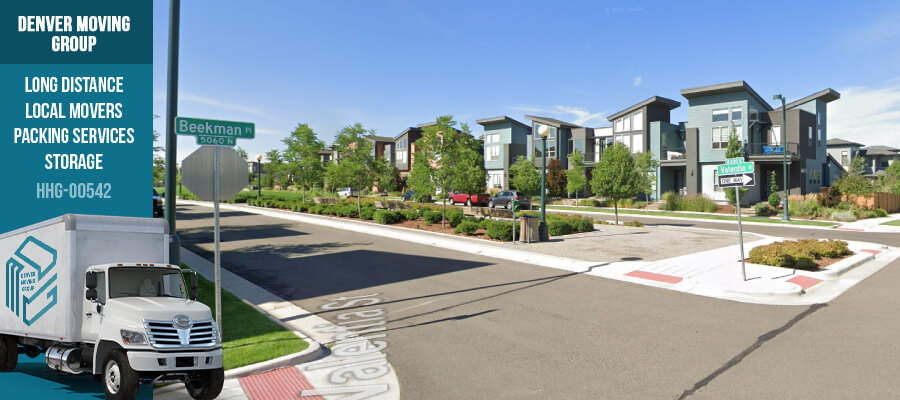
Central Park (Formerly known as Stapleton)
When you visit the Central Park area, with its tree-lined streets and happy families, you might be surprised to learn that the area was once the home of the Denver airport! Today, Central Park is much like any of the other beautiful neighborhoods in Denver. The school district is stellar, the people are friendly, and there are plenty of opportunities to enjoy seasons and year-round weather in Denver.
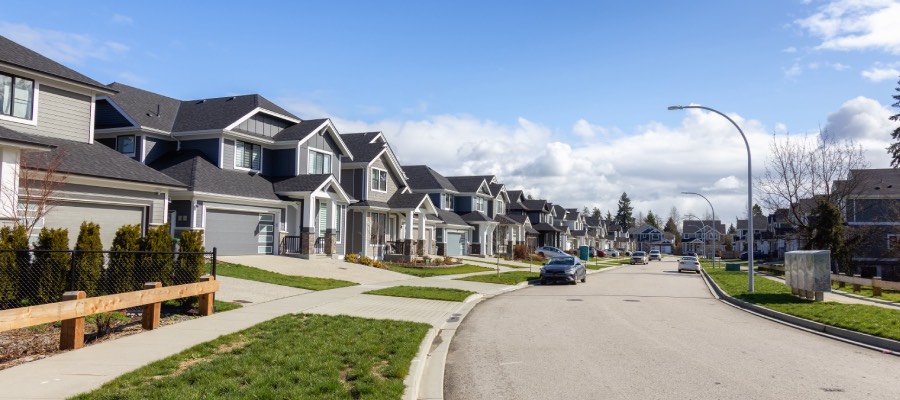
Consider Calling the Denver Suburbs Home
According to the United States Census Bureau, the population of Denver proper is 711,463 residents. Metro Denver, which is officially comprised of several cities, including Denver, Aurora, Lakefield, and Broomfield, has a population of around 2.9 million people.
Living in Denver itself is lovely. However, many young adults and families still prefer the easy, laid-back lifestyle that comes with calling the suburbs home. Denver, like other major cities, has several suburbs. Some suburbs are thriving, while others should be avoided. Here is a list of the top surrounding suburbs of Denver:
- Lone Tree
- Highlands Ranch
- Castle Rock
- Centennial
- Greenwood Village
- Thornton
- Longmont
- Lakewood
If you aren’t already convinced that suburban living is the right choice for you, consider the average home prices and average salary in Denver vs. any of the suburbs. The average home price in Denver is around $579,471. This is approximately 3% less than last year’s average price, but it is still much higher than the home prices in the suburbs. For example, the average home price in Lakewood is $333,460.
The median household income in Denver is between $78,00 and $90,000. Drive around 25 minutes away from Denver on I-25 to Centennial, CO, where the median household income is $114,375.
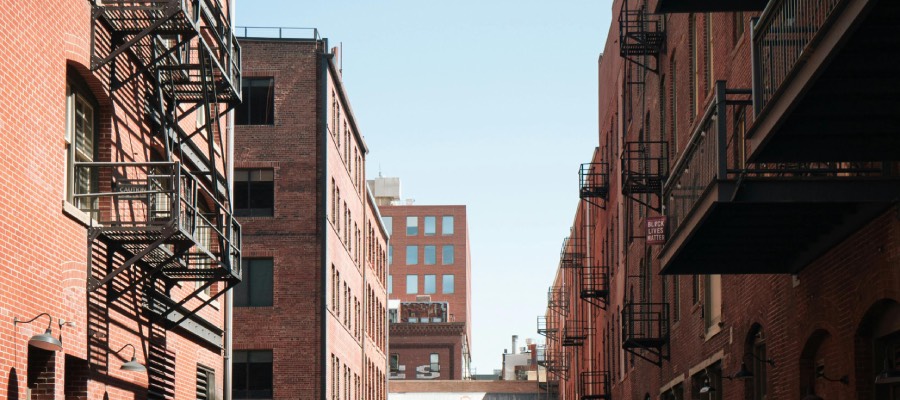
Downtown Denver vs. Other Downtown Areas
Downtown Denver is, in a word, “unique.” You can drive a few miles outside of the downtown area, and boom; you are in the mountains and mountain climbing. The downtown area has a lot of offers, including the Denver Tech Center, Denver Performing Arts Complex, Denver Art Museum, and literally thousands of restaurants, bars, and clubs in the city limits.
In this way, Denver is very similar to any other comparable major city, from San Francisco and San Diego to Seattle, Minneapolis, and Austin, TX. However, when you weed through all the similarities and get to what makes downtown Denver unique, you will quickly discover why if you are moving, you should put Denver at the top of your list.
 The Views Are Impeccable
The Views Are Impeccable
The natural beauty of Colorado is unprecedented – which is why so many people are flocking to the state. If you want that unique mixture of downtown flavor and beautiful mountain views, Denver is the place for you. Step right outside the downtown area, and you can white water raft, hike, and bike. Stay inside the city and enjoy one of Denver’s 200 parks, including the massive Confluence Park! The other cities might have skyscrapers, but Denver has those, plus unparalleled views!
 Denver’s Walkability Score
Denver’s Walkability Score
According to the real estate website Redfin, Denver’s walkability score is 61, meaning you can accomplish most errands, including grocery shopping, on foot. This number is fair when compared to other cities of a similar size, including Atlanta, GA, Mesa, AZ, and even Las Vegas! The walkability score of other major cities is much higher, including New York City, so if you love to walk instead of hopping in your car, keep this in mind.
On the bright side, Denver’s bike-friendly score is the 4th highest in the nation. Basically, this means that you can comfortably take your bike almost anywhere in the downtown area.
 A Great City for Recreation and Golfing
A Great City for Recreation and Golfing
The state of Colorado passed a bill to legalize recreational marijuana in 2012, the same year that Wahington State passed a similar bill. Colorado legalized the sale and distribution of marijuana for several reasons, including financial ones. If you want the freedom to enjoy marijuana, you can enjoy this pastime in downtown Denver.
If you prefer to get in touch with nature and find a way to treat your mental health differently, there are 16 golf courses in the Denver area. You can also drive within 20 minutes of downtown in several directions and find another 78 courses.
 A City For Beer Lovers
A City For Beer Lovers
Short of Portland, Maine, Denver has the most breweries in the city limits than any other major city in the country. Denver has a whopping 150 breweries, from major breweries to small, family-owned microbreweries. There is so much beer flowing in Denver that it is even called the “Napa Valley of Beer!”
 Be Aware of Infrastructure Issues
Be Aware of Infrastructure Issues
The population of Denver is growing rapidly. The sharp rise in the city’s population has left the local government scrambling to catch up. This means that many of the city’s core utilities, including water and electricity, require serious updating. As the city grows and the government starts to improve the downtown area’s infrastructure, this could mean higher taxes.
 Park Your Car and Take the Bus!
Park Your Car and Take the Bus!
Like any other city, it can be tricky to maneuver through downtown Denver in your car or massive SUV, which you will see everywhere throughout Colorado! Luckily, the public transportation system in Denver is one of the best in the country. You can easily park your car and hop on the bus or the light rail – or even rent a bike to explore everything downtown has to offer.
The light rail is so expansive that there is even a line from downtown to the Denver International Airport.
We Love Our Sports in Denver!
Denver is home to an impressive eight professional sports teams, making it an ideal destination for sports lovers. You can watch the Denver Broncos Empower Field at Mile High, the Denver Nuggets at Ball Arena (once called Pepsi Center), the Colorado Avalanche at Ball Arena, or catch a Colorado Rockies game at Coors Field.
Denver is also home to six impressive college sports teams if you prefer college sports. Two of those teams are Division I schools, four are Division II schools, and there are a handful of Division III colleges, including Regis University.
Denver’s Food Scene Is Like No Other!
The residents of Denver love to eat – which is why there are so many amazing restaurants, food trucks, farmer’s markets, and just about any other way you can imagine to enjoy a fantastic meal. The Mile High City is home to a unique opportunity to enjoy an eclectic variety of foods called a food hall or dining market.
The hall is something akin to a mall food court, where several restaurants and bars have separate establishments under one roof. Walking through the dining hall, you can enjoy Mexican food, including a green chile burrito, before heading out to a small craft ice cream shop and enjoying a nightcap at a bar or brewery – and all are essentially under one roof!
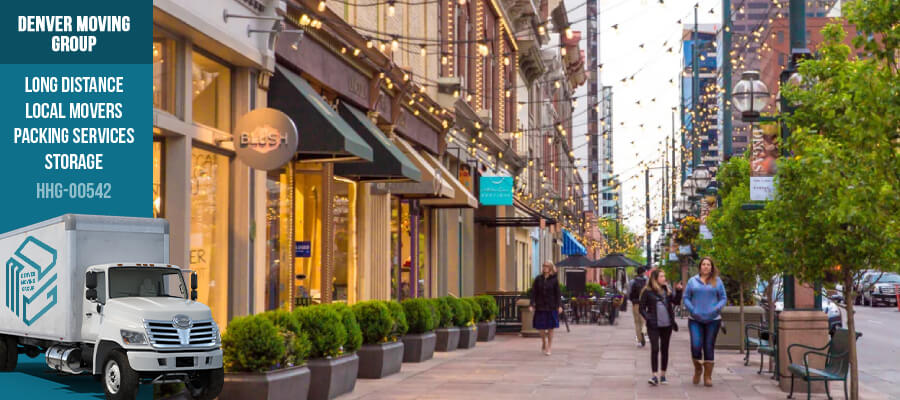
What are the Pros and Cons of Living in Denver?
Denver is one-of-a-kind, but you want to know about the actual ins and outs before contacting long-distance moving companies and packing up your home.
 The Job Market is Booming
The Job Market is Booming
The average salary in Denver is far above the national average of $58,260. This is thanks to the area’s several job opportunities and thriving industries, including the transportation, healthcare, and aviation industries. Boeing Company, for example, is headquartered in Denver, as are Dish Network, Molson Coors Brewing, Lockheed Martin, Oracle, and iBotta.
Young adults leaving college will find several tech jobs in the city center, as well. Denver can be expensive, but several high-paying jobs will cover your living expenses.
 Rising Housing Costs Could Leave You Searching for Affordable Housing
Rising Housing Costs Could Leave You Searching for Affordable Housing
To say that the housing market in Denver is competitive is an understatement. Houses do not stay on the market long, and those that do are often very expensive. The rental market is just as aggressive. The average rental price for a one-bedroom place in 2023 is just under $2,000. Rental costs in the suburbs are slightly lower, but the competition is just as fierce.
If you are hiring cross-country movers to relocate to Denver, Colorado Springs, or anywhere in Colorado – check out the housing market in the area before you move. Always have housing secured, whether purchasing a home or renting a townhouse or apartment, before moving to the area. This will ensure you are not left with a massive hotel bill while looking for affordable housing in Denver.
 Be Aware of the Area’s Crime Statistics
Be Aware of the Area’s Crime Statistics
Several neighborhoods in Denver are ranked among the safest in the country. That being written, you should be aware that there are areas in Denver specifically where the crime statistics are not as favorable. According to one website, out of the crime rates of 320 major cities examined, Denver ranked 27th, making it one of the top 30 most dangerous cities in the country.
 A Great Place to Retire
A Great Place to Retire
Denver is an excellent place for young couples and families to thrive. However, if you are an empty nester and want to enjoy your retirement, Denver has just as many things to offer. In addition to the fine dining, golfing, and chance for adventure, there are several top-tier retirement communities in the area.
There are several free activities for you and the grandkids to enjoy, and the city boasts several top-rated hospitals and clinics.
 A Thrill Seeker’s Paradise
A Thrill Seeker’s Paradise
It cannot be stated enough that Denver and Colorado, in general, are an outdoor lover’s dream. You can bike, hike, ski, raft, sail, hunt, or do just about anything your thrill-seeking heart desires. The best part is that if you live in Denver, you only have to travel a few miles outside the city limits to feel like you are in the middle of nowhere!
 The Air Quality Is Not Favorable
The Air Quality Is Not Favorable
In 2022, the American Lung Association produced the “State of the Air” report. The report took into account the particle pollution and levels of ozone in every major city. Unfortunately, Denver ranked seventh on this list. If you have asthma or are sensitive to air pollution, keep this in mind when deciding whether or not Denver is the right destination for you and your family.
Once You Adjust to the High Altitude, the Weather is Incredible
Denver is called the “Mile High City” for one simple reason – the city sits approximately one mile, or 5,280 feet, above sea level. This jump in altitude can be a lot for many people to handle, especially people with compromised immune systems, older people, or very young children. Luckily, it only takes about one to three days for your body to adjust to the altitude completely.
Once you can get past negative symptoms associated with exposure to higher elevations, you can relax and enjoy the outstanding weather. Denver’s summers are relatively mild compared to other cities in the Western United States. The average rainfall is manageable, and most days, you can get out and enjoy all of Denver’s outdoor activities.
However, be aware that the winters in Denver are notoriously brutal. The temperatures often drop below freezing, and the average annual snowfall in the westernmost suburbs of Denver is around 65 inches per year. The Denver International Airport has an average annual snowfall of about 45 inches.
The higher up in the mountains you visit, vacation, or purchase a home, the more snow, ice, wind, and cold you will encounter. Consider this fact when you search for real estate in the upper Front Range.
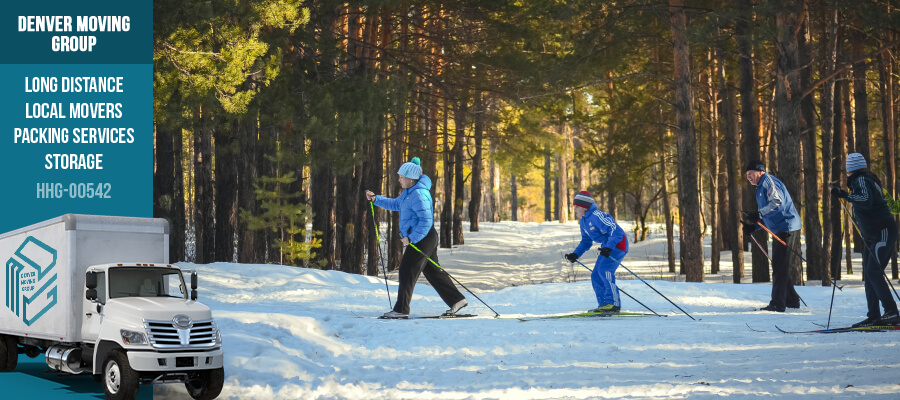
The Skiing Is Great, but the Ski Traffic Is Not
There are over a dozen ski resorts within a 2-hour radius of Denver. Ski season last from late October to early April, depending on the ski resort and the average snowfall that year. If you live anywhere around the Denver metro or in the suburbs, prepare for ski traffic. The traffic can be brutal, even in downtown Denver.
If you are moving to Denver for skiing, be prepared for the congestion and extra people for at least half the year.

In Conclusion: Is It A Good Idea to Move to Denver?
Denver is a beautiful city to call home – but be prepared to deal with both the pros and cons of living in this diverse city. There are a number of ways to spend a weekend with your partner or the kids. You can cheer on the Denver Broncos before visiting a microbrewery. Denver is a historic town filled with several museums, galleries, and sites – including the Molly Brown House, Hildebrand Ranch, and the Four Mile Historic Park.
There are, unfortunately, some downsides to living in Denver. The altitude is difficult for many people to handle. The cost of living is higher than other comparable cities, and you might have trouble finding affordable housing. As with moving to any other city, if you take your time and find the right real estate agent, it is still possible to find a great place to live in Denver, particularly in the suburbs.

Ready to Move to Denver? Here are A Few Helpful Moving Tips!
You’ve weighed the ins and outs and decided that Denver is the optimal place to find a job, start a family, or spend your golden years soaking up the weather. Packing and relocating is never easy, which is why the team at the Denver Moving Group has complied this simple list of packing and moving tips to help make your relocation to the area as stress-free as possible:
 Declutter before you pack a single box. Get the whole family involved in decluttering your house before you purchase packing supplies. The most straightforward plan is to divide everything in your home into three categories: keep, toss, or donate/sell. Taking a few days to throw away, give away, or donate your unwanted belongings can save a lot of money on moving day.
Declutter before you pack a single box. Get the whole family involved in decluttering your house before you purchase packing supplies. The most straightforward plan is to divide everything in your home into three categories: keep, toss, or donate/sell. Taking a few days to throw away, give away, or donate your unwanted belongings can save a lot of money on moving day.
 Start packing at least three to six months in advance. One of the most common mistakes homeowners make is waiting until the last second to start packing. As a rule, try to start packing at least three to six months before your intended moving date. This will give you plenty of time to not only gather packing supplies but also carefully and expertly pack every box.
Start packing at least three to six months in advance. One of the most common mistakes homeowners make is waiting until the last second to start packing. As a rule, try to start packing at least three to six months before your intended moving date. This will give you plenty of time to not only gather packing supplies but also carefully and expertly pack every box.
 Watch out for moving scams. The majority of moving companies are reputable and established and will work tirelessly to meet all your needs. Unfortunately, there are a few scammers in the Denver area – and it is critical to recognize a moving scam from a credible moving company. For example, one of the most common scams is a moving company that provides a quote without visiting your home. A credible long-distance mover will visit your home and survey your belongings before giving a free quote.
Watch out for moving scams. The majority of moving companies are reputable and established and will work tirelessly to meet all your needs. Unfortunately, there are a few scammers in the Denver area – and it is critical to recognize a moving scam from a credible moving company. For example, one of the most common scams is a moving company that provides a quote without visiting your home. A credible long-distance mover will visit your home and survey your belongings before giving a free quote.
 Secure at least three moving quotes. Receive at least three comprehensive moving quotes from different moving companies. The quote should include some specific information, including the prospective moving date, the cost of the relocation, transportation charges, the estimated weight of your household goods, and the cost of packing services and supplies, if applicable.
Secure at least three moving quotes. Receive at least three comprehensive moving quotes from different moving companies. The quote should include some specific information, including the prospective moving date, the cost of the relocation, transportation charges, the estimated weight of your household goods, and the cost of packing services and supplies, if applicable.
 Packing supplies don’t have to be expensive! Finally, if you decide to pack on your own, you don’t need to spend a small fortune on packing supplies. There are several inexpensive ways to score all the supplies you will need for your move. For example, in addition to getting free boxes at your local grocery store, ask friends and neighbors. Look for creative packing solutions in your home. You can store jewelry in old egg cartons or slip garbage bags over hanging clothes to save space in boxes.
Packing supplies don’t have to be expensive! Finally, if you decide to pack on your own, you don’t need to spend a small fortune on packing supplies. There are several inexpensive ways to score all the supplies you will need for your move. For example, in addition to getting free boxes at your local grocery store, ask friends and neighbors. Look for creative packing solutions in your home. You can store jewelry in old egg cartons or slip garbage bags over hanging clothes to save space in boxes.
Do you live in the Denver area already and want to work with the best movers in town? Give our fantastic team a call immediately for a free quote!
Frequently Asked Questions About Moving to Denver:
 Is it a good idea to move to Denver?
Is it a good idea to move to Denver?
This ultimately depends on personal preference, but Denver has a lot to offer including about 300 days of sunshine, a robust job market, a vibrant outdoor scene, and a rich arts and culture scene. However, Denver is also the 16th most expensive city in the country, so the cost of living can be quite high compared to some other cities1.
 What are the pros and cons of living in Denver?
What are the pros and cons of living in Denver?
Pros of living in Denver include easy access to outdoor activities, a strong job market, a rich arts and culture scene, and plentiful sunshine. Cons include a high cost of living, potentially long commutes, and the challenges that come with living in a rapidly growing city, such as increased traffic and higher housing costs1.
 What is a good salary in Denver?
What is a good salary in Denver?
The average salary in Denver is $84,944 per year, with the most typical earning being $72,000 per year.
 What you should know before moving to Denver?
What you should know before moving to Denver?
Denver is divided into several regions, each containing multiple neighborhoods with their own unique character. The average rent for a one-bedroom is $1,967/month, but it can differ greatly depending on the neighborhood. Commutes in Denver can be long and potentially stressful. The city has experienced rapid growth and many people are moving to the suburbs due to the high cost of housing and other issues.
 Are people moving out of Denver?
Are people moving out of Denver?
Yes, there has been a recent trend of people moving out of Denver city limits and into the suburbs due to issues like expensive housing and crime. However, the overall interest in moving to the Denver metropolitan area remained largely positive from 2020 to early 2023. Most people who leave Denver stay within Colorado, but those who leave the state are often interested in places like Portland, Oregon, and Seattle, Washington.
 What area of Denver is best to live?
What area of Denver is best to live?
The “best” area to live in can depend on personal preference, but in terms of popular choices, the Denver neighborhoods with the most moving interest in 2023 includes Broomfield, Denver zip codes 80206 and 80202, Golden, and Aurora. Conversely, there was a significant move-out interest from neighborhoods such as Aurora (80016), Highlands Ranch, Denver (80203), Centennial, and Cherry Creek.
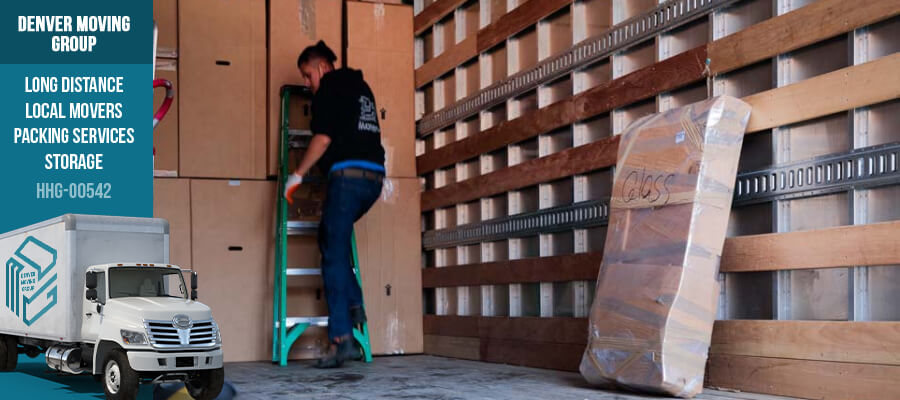
Want to Work With the Best Moving Company in the Denver Metro Area? Look No Further than Denver Moving Group
At The Denver Moving Group, we are thrilled to call Denver, which is one of arguably the Top Ten Cities to live, home. If you live in the Denver area and want to plan a new adventure in a new city, contact us today! With several decades of experience serving the amazing people of Denver, our highly-trained staff can help you plan every step of your relocation from start to finish.
 A Full-Service Moving Team That Can Meet All Your Expectations
A Full-Service Moving Team That Can Meet All Your Expectations
Whether you are moving to Colorado Springs, Seattle, New York City, or Portland, Oregon – our team can provide an extensive array of amazing services to meet all your needs. In addition to long-distance moving services, we also offer packing services and short-term storage.
Packing services are especially helpful if you simply don’t have the time in your busy schedule to pack up your entire household. Whether you live in a modest one-bedroom apartment or a sprawling five-bedroom house, we can help you pack up and load all your precious household belongings.
In addition to comprehensive long-distance moving services, we are also top-rated local movers. Aren’t sure which services you require? Typically, a long-distance move is any relocation that is at least 50 to 100 miles away from your current residence. If you are relocating to the suburbs around Denver, you typically require local movers.
 Contact Us Today For a Free Quote On All Your Moving and Packing Needs
Contact Us Today For a Free Quote On All Your Moving and Packing Needs
A representative from Denver Moving Group is ready to start the process of moving you away from the Denver area. Call us today for a free quote on all your moving, packing, and storage needs.

